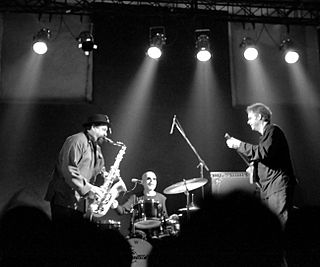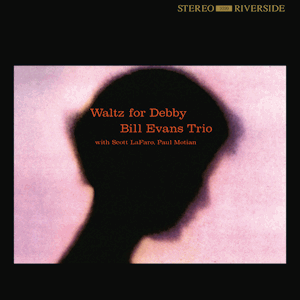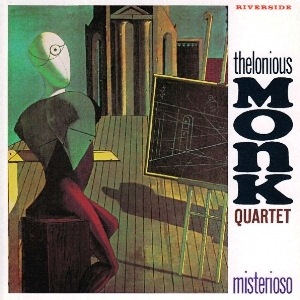
William John Evans was an American jazz pianist and composer who mostly played in trios. His use of impressionist harmony, inventive interpretation of traditional jazz repertoire, block chords, and trademark rhythmically independent, "singing" melodic lines continues to influence jazz pianists today.

John Aaron Lewis was an American jazz pianist, composer and arranger, best known as the founder and musical director of the Modern Jazz Quartet.

Portrait in Jazz is an album by American jazz pianist Bill Evans, released in 1960.

Explorations is an album by jazz pianist Bill Evans that was originally released on Riverside label in 1961. The album won the Billboard Jazz Critics Best Piano LP poll for 1961.

Sunday at the Village Vanguard is a live album by jazz pianist and composer Bill Evans and his Trio consisting of Evans, bassist Scott LaFaro, and drummer Paul Motian. Released in 1961, the album is routinely ranked as one of the best live jazz recordings of all time.

Stephen Paul Motian was an American jazz drummer, percussionist, and composer. Motian played an important role in freeing jazz drummers from strict time-keeping duties.
Edwin James Costa was an American jazz pianist, vibraphonist, composer and arranger. In 1957 he was chosen as Down Beat jazz critics' new star on piano and vibes – the first time that one artist won two categories in the same year. He became known for his percussive, driving piano style that concentrated on the lower octaves of the keyboard.

Waltz for Debby is a live album by jazz pianist and composer Bill Evans and his Trio consisting of Evans, bassist Scott LaFaro, and drummer Paul Motian. It was released in 1962.
The following is a listing of the jazz pianist Bill Evans' original albums. He recorded over 50 albums as a leader between 1956 and 1980 and also played as a sideman on nearly as many more. He broke new ground in many of his piano trio, duet and solo recordings. Several of those won or were nominated for Grammy Awards.

Misterioso is a 1958 live album by American jazz ensemble the Thelonious Monk Quartet. By the time of its recording, pianist and bandleader Thelonious Monk had overcome an extended period of career difficulties and achieved stardom with his residency at New York's Five Spot Café, beginning in 1957. He returned there the following year for a second stint with his quartet, featuring drummer Roy Haynes, bassist Ahmed Abdul-Malik, and tenor saxophonist Johnny Griffin. Along with Thelonious in Action (1958), Misterioso captured portions of the ensemble's August 7 show at the venue.

A jazz trio is a group of three jazz musicians, often a piano trio comprising a pianist, a double bass player and a drummer. The pianist is usually considered the leader of these trios, and trios are usually named after their pianist. Famous examples include the Bill Evans Trio with Scott LaFaro on bass and Paul Motian on drums; and the Vince Guaraldi trio, featuring Fred Marshall and Jerry Granelli.

1958 Miles is a compilation album by American jazz musician Miles Davis, released in 1974 on CBS/Sony. Recording sessions for tracks that appear on the album took place on May 26, 1958, at Columbia's 30th Street Studio and September 9, 1958, at the Plaza Hotel in New York City. 1958 Miles consists of three songs featured on side two of the LP album Jazz Track, which was released in November 1959, one song from the same session not appearing in the album, and three recordings from Davis' live performance at the Plaza Hotel with his ensemble sextet. The recording date at 30th Street Studio served as the first documented session to feature pianist Bill Evans performing in Davis' group.
Wendell Marshall was an American jazz double-bassist.

The Jazz Workshop is the debut album by jazz composer George Russell, featuring his "Smalltet", which included Art Farmer, Hal McKusick, Barry Galbraith, and Bill Evans.

2-3-4 is an album by American jazz drummer Shelly Manne featuring performances recorded in 1962 for the Impulse! label.
"Nardis" is a composition by American jazz musician Miles Davis. It was written in 1958, during Davis's modal period, to be played by Cannonball Adderley for the album Portrait of Cannonball. The piece has come to be associated with pianist Bill Evans, who recorded it repeatedly.

Jaki Byard Quartet Live! is an album by pianist Jaki Byard recorded in 1965 and originally released on the Prestige label as two long LP records and later reissued in 1992 as a single CD.
This is the discography of American jazz musician Paul Motian.
"Django" is a 1954 jazz standard written by John Lewis as a tribute to the Belgian-born jazz guitarist Django Reinhardt. It was a signature composition of the Modern Jazz Quartet, of which Lewis was the pianist and musical director.













